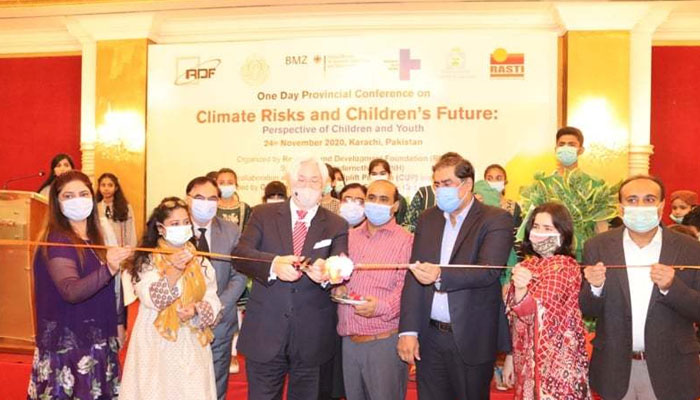Moot stresses need to recognise severity of climate change impacts
In a first of its kind conference on climate change risks to the future of children in Pakistan, a large number of children and youths hailing from various academic institutions shared their experiences of dealing with climate change impacts and vulnerabilities, as well as the way forward to address these challenges.
The conference was organised by The Research and Development Foundation (RDF) in collaboration with a German International Child Focused Development Organization Kindernothilfe (KNH), co-financed by the German Federal Ministry for Economic Cooperation and Development (BMZ) and the Sindh government.
The conference, held at a local hotel on Tuesday, attracted the participation of more than 150 children and youths, government officials and civil society representatives, who opined that children’s rights of dignified access to safe water, sanitation, quality education, food, health, socialisation, participation and association were affected in any disaster.
German Counsel General in Karachi Holger Ziegler, who inaugurated the conference, recognised the efforts of the RDF for supporting Pakistan’s government to explore future actions to address climate-related challenges from children and youths’ perspective. He said that there was “a dire need for people to recognise the severity of climate change impacts and encourage children and youth to play an active role in combating climate change”.
Murtaza Wahab, adviser to the Sindh chief minister on law, environment and coastal development, who was the chief guest at the event, said awareness regarding climate change was very crucial for mitigating its effects.
He appreciated the strategies of the RDF to engage women, children and youths from Tharparkar, Khipro, and far-flung areas of seven districts of Sindh who were interacting with German experts and the German Consulate. He encouraged the audience not to rely on politicians and government only but to take the responsibility themselves to play their role in the fight against climate change.
Youth leader from Germany Line Niedeggen interacted with the children and youths and described how the Fridays for Future movement in Germany was mobilising youth for climate resilience building.
Sharing her journey of starting this movement in Germany, she said that in the initial days, they received an amazing response from the children and youths and they showed their willingness to join their movement. She emphasised that people should listen to science and the best scientific results, not to individuals, not to Greta, and not to her.
Ashfaque Soomro, RDF’s executive director, said that all stakeholders should come forward to work together for bright and resilient future prospects for the children and youths, who were 64 per cent of Pakistan’s total population. “We are the fifth-youngest nation in the world, but at the same time we are the fifth nation most vulnerable to climate change,” he said.
Director-General Pakistan Meteorological Department Riaz Ahmed said that climate change is not a short-term problem but a long-term problem. He referred to the data generated by the meteorological department about the extreme weather witnessed in Pakistan in the recent years. He added that fluctuations in rain in Sindh were frequent and caused urban flooding instead of riverine floods.
Kiran Shahzadi, country coordinator of the KNH in Pakistan, said the KNH was a German child-focused organization, which had been working in Pakistan through 23 projects since the late 1970s and supporting many child and climate-related projects in Pakistan.
-
 Kate Hudson Explains Why Acting Isn't Discussed At Home
Kate Hudson Explains Why Acting Isn't Discussed At Home -
 Prince William, Kate Middleton Epstein Statement Was AI Generated, Says Expert
Prince William, Kate Middleton Epstein Statement Was AI Generated, Says Expert -
 Sarah Ferguson On Her Way To Hurt 'only Two People Who Care About Her'
Sarah Ferguson On Her Way To Hurt 'only Two People Who Care About Her' -
 World’s Top PC Maker Sounds Alarm Over Memory Chip Shortage
World’s Top PC Maker Sounds Alarm Over Memory Chip Shortage -
 King Charles Is ‘clearly Worried’ Andrew Has Tarnished Royal Image
King Charles Is ‘clearly Worried’ Andrew Has Tarnished Royal Image -
 Royal Family Loses 'loyal' Worker After King Charles Disliked His Work?
Royal Family Loses 'loyal' Worker After King Charles Disliked His Work? -
 James Van Der Beek's Quiet Sacrifice Before Death Comes To Light
James Van Der Beek's Quiet Sacrifice Before Death Comes To Light -
 Suspect Kills Six Across Florida Before Taking His Own Life
Suspect Kills Six Across Florida Before Taking His Own Life -
 AI Helps Researchers Identify 2,000-year-old Roman Board Game Stone
AI Helps Researchers Identify 2,000-year-old Roman Board Game Stone -
 Inside Kate Middleton, Prince William’s Nightmare Facing Andrew Mountbatten-Windsor
Inside Kate Middleton, Prince William’s Nightmare Facing Andrew Mountbatten-Windsor -
 Margaret Qualley Shares Heartfelt Confession About Husband Jack Antonoff: 'My Person'
Margaret Qualley Shares Heartfelt Confession About Husband Jack Antonoff: 'My Person' -
 Savannah Guthrie Shares Sweet Childhood Video With Missing Mom Nancy: Watch
Savannah Guthrie Shares Sweet Childhood Video With Missing Mom Nancy: Watch -
 Over $1.5 Million Raised To Support Van Der Beek's Family
Over $1.5 Million Raised To Support Van Der Beek's Family -
 Paul Anthony Kelly Opens Up On 'nervousness' Of Playing JFK Jr.
Paul Anthony Kelly Opens Up On 'nervousness' Of Playing JFK Jr. -
 Diana Once Used Salad Dressing As A Weapon Against Charles: Inside Their Fight From A Staffers Eyes
Diana Once Used Salad Dressing As A Weapon Against Charles: Inside Their Fight From A Staffers Eyes -
 Video Of Brad Pitt, Tom Cruise 'fighting' Over Epstein Shocks Hollywood Fans
Video Of Brad Pitt, Tom Cruise 'fighting' Over Epstein Shocks Hollywood Fans




